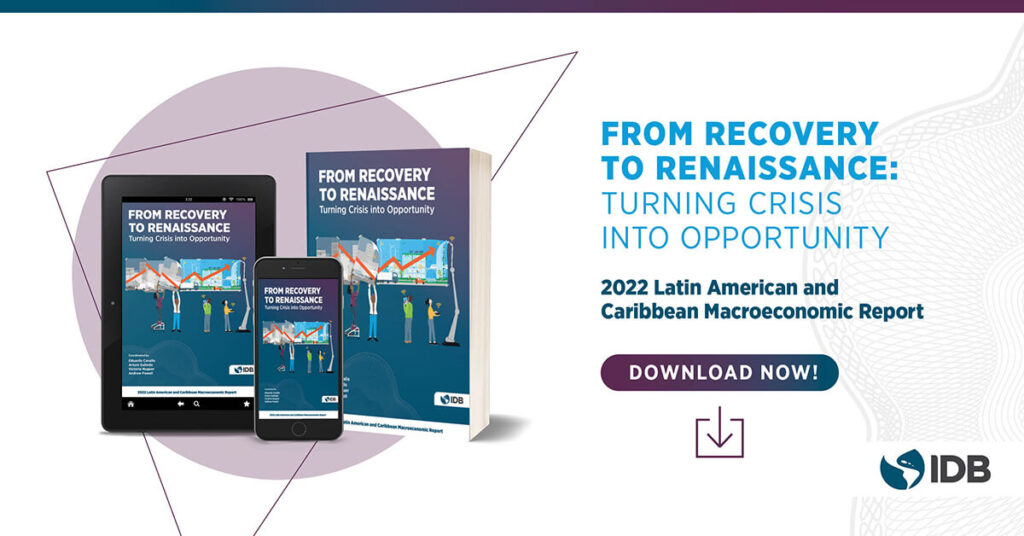
After significant efforts by Latin American and Caribbean governments to shore up businesses and households during the COVID-19 pandemic, the region in 2021 had a very high average fiscal deficit of 5% of GDP, more than two percentage points higher than before the pandemic. It also had a soaring average debt ratio of 70% of GDP.
The IDB’s recently released 2022 Latin American and Caribbean Macroeconomic Report includes many recommendations for reducing those levels and achieving fiscal and debt sustainability over the long term. But without a doubt, one of the most important involves a frontal campaign against labor informality, which affects more than half of the workforce in the region and has financially handicapped both individuals and societies for decades.
The Curses of Informality
Informality, the condition of being self-employed or working for firms that fail to register with authorities or pay taxes, causes workers to be deprived of health insurance and contributory pensions, as well as protection through labor regulations. For governments, it means greater evasion by companies and individuals and less ability to target social transfers—two of the largest sources of inefficiency in fiscal policy and, hence, aggravators of fiscal sustainability problems.
Unfortunately, the pandemic greatly complicated the problem of informality because the large drop in employment was mainly filled with informal jobs. And informality rates may increase in the post pandemic as people return to the workforce but are unable to find formal jobs, making a long-term structural problem even worse.

Governments in the region struggle to get their fiscal house in order when there are high levels of informality. Given the essentially unregistered nature of informal jobs, high informality means that governments lack reliable data on taxpayer’s incomes for collecting tax payments, fueling rampant income tax evasion that stands at four times the level in the United States. Collection of the value-added tax also becomes more difficult as informal activities and commercial transactions are more likely to be settled in cash without receipts.
Because informality impedes the collection of data on a large portion of the citizenry, it similarly makes it harder for governments to precisely target transfers, or welfare payments, generating inefficient spending, or leakages, and affecting both government coffers and the welfare of citizens, especially the poor. Indeed, informality can thwart even the best designed fiscal reforms.
Reforms to Combat Informality and Collect Better Fiscal Data
Governments have tried to solve the information problem associated with informality by resorting to old censuses and citizens’ own declarations of needs. But those capture only about 60% of the variability in incomes.
A better approach, explored in the recently released macroeconomic report, is for governments to digitalize transactions. Working with banks and other entities, they can push to make more transactions dependent on debit and credit cards that generate an automatic record which, in turn, is linked with consumers’ social, income, wealth, property, and consumption data. Governments, while protecting anonymity, can then use that data to reduce tax evasion and target cash transfers to the poor. A version of such a system was implemented in Argentina in the late 1990s and yielded more than $100 million in saved resources as well as decreased tax evasion. Another version, conceived of as an emergency cash program during the pandemic and called “Vale Digital,” saved the Panamanian government 0.6% of GDP, or $300 million.
Meanwhile, a negative income tax, like the Earned Income Tax Credit in the United States, can help push low-income workers into formality. These programs, as proposed by IDB colleagues, reward formality since payments (credits) are not reduced to zero if the worker opts to work formally; rather, the benefit is reduced gradually, ensuring that the reward of working formally (formal salary plus transfer or credit) is always greater than working informally. Importantly, they cost only a fraction of alternatives, like the universal basic income.
Informality and the Value-Added Tax
A reconfiguration of the value-added tax (VAT) so that it is progressive and designed to help the poor could also improve fiscal outcomes. At present, VATs are applied across income brackets and occasionally exempt food or other essential products. The key to a more efficient system is to apply value-added taxes to all products and then refund them to the poor. This would increase revenues and the progressivity of the tax system at the same time because the current exemptions of VAT (also known as tax expenditures) are mostly pro-rich. Potential recipients of a refund also would likely demand receipts for their purchases, creating an incentive to formalize transactions.
Credible fiscal institutions that guarantee equity would help alleviate social tensions in Latin America and the Caribbean. They would also improve fiscal outcomes, help reduce the cost of borrowing for both governments and citizens, and potentially contribute to improving debt sustainability. The region’s governments did an admirable job extending subsidies and other forms of support to struggling businesses and households during the pandemic. They must now institute reforms to tackle informality and other persistent problems as they get their fiscal house in order.


The arguments put forward to improve tax revenues and the ability of governments to implement robust public policies are undoubtedly correct. However, adopting the suggested measures involves correcting tax institutional deficiencies that encourage informality; such as inconvenient and unnecessary tax expenditures (exonerations and exemptions), and the excessive complexity of the tax system that leads to overlapping taxes and the excessive tax burden of some sectors compared to that of others. In Venezuela, the lag in the unit tax adjustment for inflation has been causing a highly regressive redistribution, both in the personal and corporative income tax.